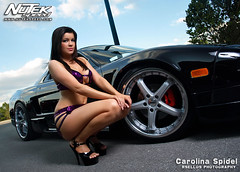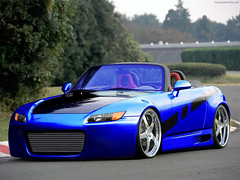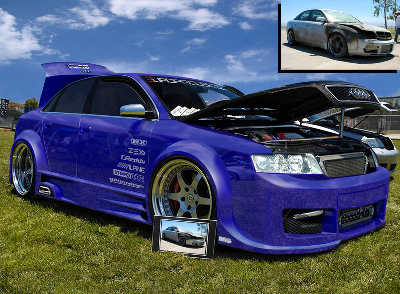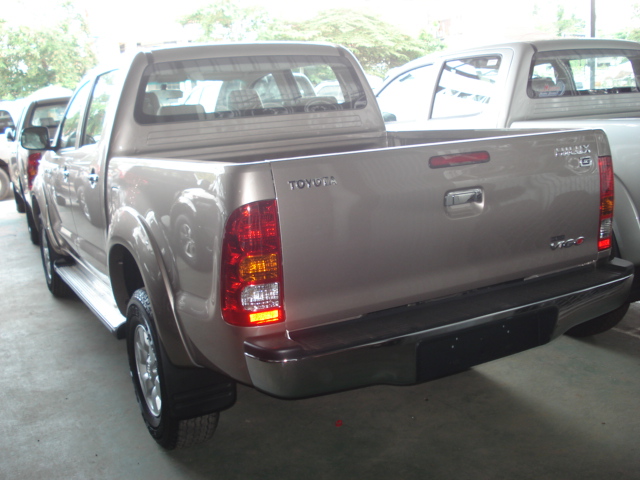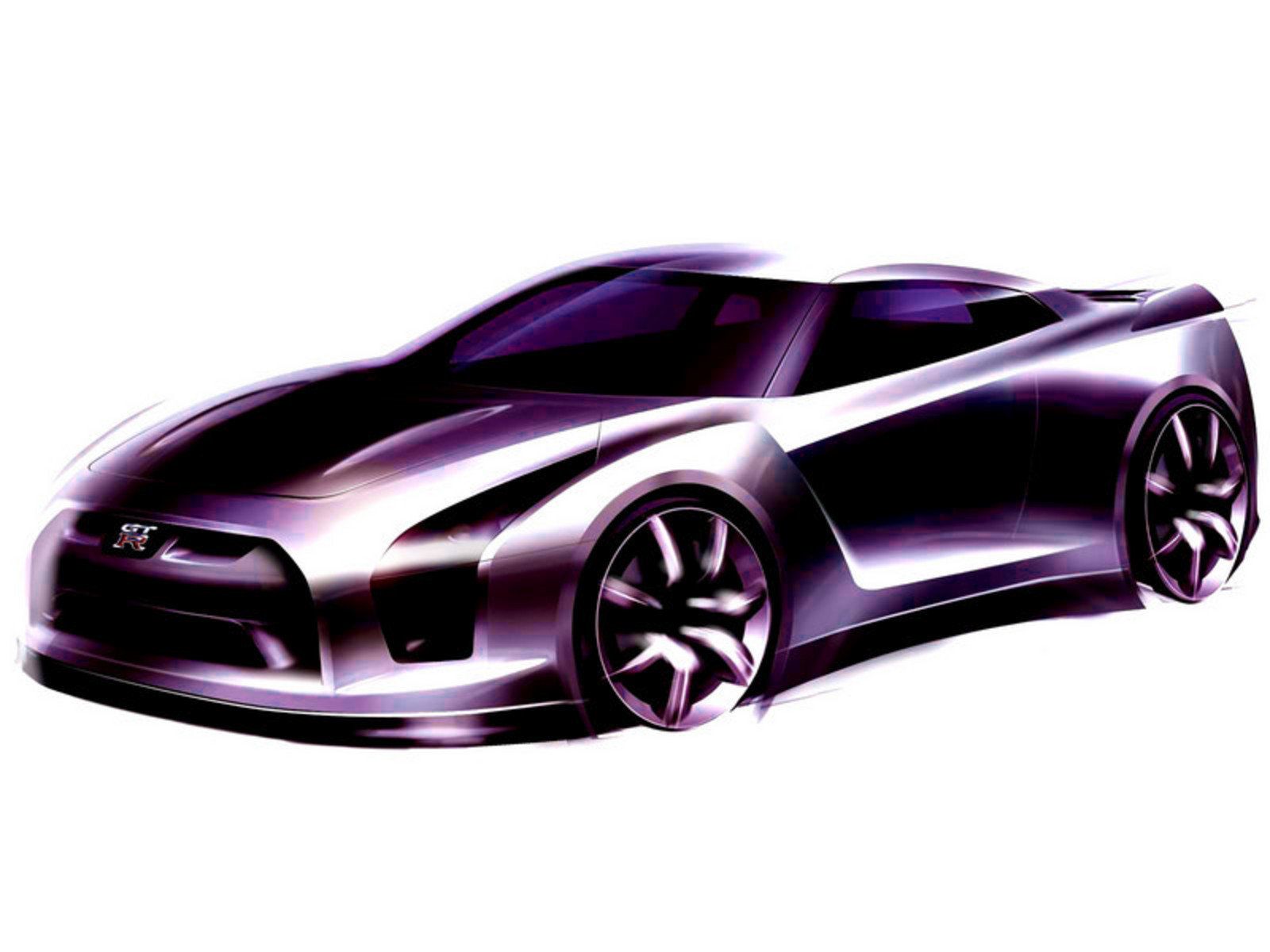|
|---|
|
|---|
Friday, April 29, 2011
2012 Subaru Impreza
Subaru has shown for first time the all-new Impreza, which makes its world premier at the 2011 New York International Auto Show. The 2012 model Impreza features specially designed interior space with quality and refinement attention, new engines and transmissions, and refined AWD chassis for even better ride and handling. The all new Subaru Impreza conveys a bolder design that emphasizes its sporty...
2012 Kia Soul Cars
Kia Soul is fine-tuned for 2012 with a significant number of technology and powertrain enhancements to deliver more power and improved fuel efficiency. This Kia’s compact crossover will amplify the fun-to-drive factor with significant horsepower increases, new six-speed transmissions and the ability to deliver up to 34 miles per gallon on the highway. The 2012 Soul’s new 1.6-liter GDI...




Thursday, April 28, 2011
Porsche 911 GT3 RS
Porsche Manufacturers increasingly satisfying customers. Not enough to present the Porsche 911 GT2 RS 911 GT3 RS Carrera deliver 4.0 as a limited edition racing car.
His form with the addition of more sporty body kit to the rear wing. Porsche 911 GT3 RS is made to accommodate the speed lovers.
To make a more aggressive power pacunya, Porsche 911 GT3 RS seconded by Boxer engine 6-cylinder 4000 cc engine mated with 6 speed transmission. The ability of the engine can catapult power up to 368 kW (500 hp) at 8250 rpm and 460 Nm of torque at 5750 rpm frontier.
Carrera 911 GT3 RS offers a reliable engine performance. Porsche Carrera 911 GT3 RS can be run from the point of 0-100 km / h with a count time of 3.9 seconds.
While concoction Porsche engineers managed to make the car move from the point of 000-200 km / h with a time under 12 seconds with a maximum speed of 306 km / hour.
The test results on the Nurburgring-Nordschleife circuit, 911 GT3 RS around the circuit is proven with 7 minutes, 27 seconds.
The weight is now down to 1360 kg full tank of fuel. That's because the 911 GT3 RS Carrera uses carbon fiber material on the hood, wing. While the rear window is made from the strongest plastic basic material.
For the security of motorists and passengers Porsche has pinned the roll bar and bucket seats. And for the interior is decorated with 2 colors ie black and red.
The launch of the Porsche 911 GT3 RS 4.0 made in Germany in July 2011. The car will be priced 178,596 euros, or about USD 2.2 billion, including tax.
Well, if you're interested in bringing the car, at least a game message. For as quoted from the official website of Porsche, on Thursday (04/28/2011) the car is only produced as much as 600 units.
His form with the addition of more sporty body kit to the rear wing. Porsche 911 GT3 RS is made to accommodate the speed lovers.
To make a more aggressive power pacunya, Porsche 911 GT3 RS seconded by Boxer engine 6-cylinder 4000 cc engine mated with 6 speed transmission. The ability of the engine can catapult power up to 368 kW (500 hp) at 8250 rpm and 460 Nm of torque at 5750 rpm frontier.
Carrera 911 GT3 RS offers a reliable engine performance. Porsche Carrera 911 GT3 RS can be run from the point of 0-100 km / h with a count time of 3.9 seconds.
While concoction Porsche engineers managed to make the car move from the point of 000-200 km / h with a time under 12 seconds with a maximum speed of 306 km / hour.
The test results on the Nurburgring-Nordschleife circuit, 911 GT3 RS around the circuit is proven with 7 minutes, 27 seconds.
The weight is now down to 1360 kg full tank of fuel. That's because the 911 GT3 RS Carrera uses carbon fiber material on the hood, wing. While the rear window is made from the strongest plastic basic material.
For the security of motorists and passengers Porsche has pinned the roll bar and bucket seats. And for the interior is decorated with 2 colors ie black and red.
The launch of the Porsche 911 GT3 RS 4.0 made in Germany in July 2011. The car will be priced 178,596 euros, or about USD 2.2 billion, including tax.
Well, if you're interested in bringing the car, at least a game message. For as quoted from the official website of Porsche, on Thursday (04/28/2011) the car is only produced as much as 600 units.
Car Stereo Installation Guide
 If you find the professionals charge a good deal of money to set up the car stereo, you can do it yourself and save that amount paid towards the expert.
If you find the professionals charge a good deal of money to set up the car stereo, you can do it yourself and save that amount paid towards the expert.It is not very difficult to install a car audio system; it is just that it seems so. You only need a bit of precision and focus to put up the system. No specialized skills or intimate knowledge on car audio is required for this purpose. You can actually put the excess money that you save from the installation process behind the best car audio system itself, thus giving you the scope to buy something better.
While initiating the process, you need to be careful as loss of concentration may lead to the damage of equipments of your car and spoil the quality of the car stereo system. You need to be systematic as the plugs go into their respective sockets only.
Getting started
• After you purchase a new car audio system, see if it is fitting properly to the place of the old audio system. Along with your new car stereo system, also buy a cabling strap which is mechanized according to the car and stereo model and works brilliantly for new car stereo systems.
• Before you get down to your work, arrange for few tools like electrical tape, wire strippers, screwdrivers and wire cutters.
• If you are not able to unscrew out the old audio system, take some guidance on the right way to remove it from your dashboard where the new car stereo will fit in.
Removing the old car stereo
• At first, detach the negative cable from the battery as you should never work with that cable connected.
• Take out the dash board of your car to remove the old car audio system and check the wires that are linked at the back. Either there would be a single plug with too many wires attached to them or else a cluster of single wires. In case of the later one, it is best to disconnect them one at a time to avoid confusion.
• Put the connectors into the new cabling strap and plug it back into your new car stereo.
If you have successfully done this, you can leave out on the next section.
Connecting the Wiring Manually
• If there is no cabling strap support, attach each of the wires at the back of the back of the new car stereo very carefully.
• Slowly detect the positive wires from each speaker and connect them at the back of the positive connector of the new car stereo. Similarly, do the same with the negative wires of each speaker and connect them to the negative connectors of the car audio system. In case, if there is only one wire coming out from the speakers, the speakers are grounded at the chassis and you would have to install a new wiring for the speakers.
• The negative wire, attached with metal and not plastic should be connected with a screw near the radio in the dash.
• The ignition wires and the 12 constant, both positive is supposed to be connected together to the back of the new stereo.
Putting in the car stereo
• All the wires should be attached to a single connector which is coming out from the additional cabling strap or the one which came along with the car stereo system where all the wires have been connected to.
• If there is no new bracket to place the new car stereo, use the old one that previously held the factory stereo system.
• Now put the final connector which is the cabling strap at the back of the stereo system along with the antenna, a long wire which was previously connected at the back of the old stereo and the power wire at the back of the new car stereo unit.
• Put the stereo system inside the dashboard where the previous system was placed but do not put back the screws as you may require testing the system.
• Now is the time when you should again attach back the negative cable to the battery.
• Start your car as well as power on the car stereo unit. Check keenly, whether all the speakers attached is working fine.
• Put the screws back into the stereo system and put the cover of the dash board back on.
In case results are unsatisfactory
If you still find the system is not delivering satisfying results, you can use a wooden or fiberglass flummox with which the sound quality will get better and you can even include noise reduction objects like liners, glue strips, put in more carpets on the inner panel and use sprays.
Car Show 2011 Nissan Elgrand

2011 Nissan Elgrand comes in two engine options: 3.5-liter engine and 2.5-liter engine. The 2011 Nissan Elgrand 3.5-liter VQ35DE has a maximum output of 206kW(280PS)/6400rpm and maximum torque of 344Nm (35.1kgfm)/4400rpm). And at the 2.5-liter QR25DE Nissan Elgrand, it has a maximum output of 125kW(170PS)/5600rpm and maximum torque of 245Nm (25.0kgfm)/3900rpm).

The 2011 Nissan Elgrand’s interior offers a number of features designed specifically for passenger comfort, including unique, multi-function high quality seats with leg rest and the world’s first 11-inch electronic retractable monitor used in a minivan. There is also a Private Theater System powered by a Bose® 5.1 Surround Sound System is available for the rear seats.


new car,car show, nissan
source : otonews.com
Car makers shut shop for a while [pictures
In reporting this story, we have to underline the obvious human toll of the disaster, as well as the horrendous destruction to property and the livelihoods of the Japanese people. While the international news networks continue their excellent work covering the story, as car journalists and huge fans of Japanese cars in general, we thought we should bring you this story.

Honda, Nissa, Toyota and Subaru, Isuzu and Hino Motors (a large truck manufacturer) have all halted production indefinitely in Japan, as the country takes stock of the destruction caused by last week’s earthquake and subsequent tsunami. At least one person died at Honda’s R&D facility, and two fires broke out at a Nissan plant.
Nissan has reported damage to 2300 new vehicles and minor damages to four of its factories. While the factories themselves have reported little damage, transport networks and of course the ports, via which all cars are exported to foreign markets, have been badly damaged and will take considerable time to repair.
Car makers are likely to keep assembly plants closed until they are certain the supply chain has recovered enough to meet the demands of regular production. At this point it is unclear whether the effects will be felt in overseas markets, although there is likely to be a disruption in new models and/or parts in the North American market.

The Japanese manufacturers are widely known for running “just-in-time” assembling methods. This means that the parts for a particular model arrive at the factory hours, even minutes before they are needed. This is all good and well when everything is running smoothly, but the tsunami has led to a massive disruption in this system. Some part suppliers are set up very close to the factories, but many are further afield, particularly in the north-western region of the country, most heavily affected by the tsunami.
New cars which were standing in ports waiting to be exported were smashed, burned and mostly drowned as the water rushed over breakwaters, leading to some astonishing images of thousands of cars being destroyed.

Honda, Nissa, Toyota and Subaru, Isuzu and Hino Motors (a large truck manufacturer) have all halted production indefinitely in Japan, as the country takes stock of the destruction caused by last week’s earthquake and subsequent tsunami. At least one person died at Honda’s R&D facility, and two fires broke out at a Nissan plant.
Nissan has reported damage to 2300 new vehicles and minor damages to four of its factories. While the factories themselves have reported little damage, transport networks and of course the ports, via which all cars are exported to foreign markets, have been badly damaged and will take considerable time to repair.
Car makers are likely to keep assembly plants closed until they are certain the supply chain has recovered enough to meet the demands of regular production. At this point it is unclear whether the effects will be felt in overseas markets, although there is likely to be a disruption in new models and/or parts in the North American market.

The Japanese manufacturers are widely known for running “just-in-time” assembling methods. This means that the parts for a particular model arrive at the factory hours, even minutes before they are needed. This is all good and well when everything is running smoothly, but the tsunami has led to a massive disruption in this system. Some part suppliers are set up very close to the factories, but many are further afield, particularly in the north-western region of the country, most heavily affected by the tsunami.
New cars which were standing in ports waiting to be exported were smashed, burned and mostly drowned as the water rushed over breakwaters, leading to some astonishing images of thousands of cars being destroyed.
GMC Sierra All Terrain HD Concept is ready to play dirty
Cars are cool, but we certainly love ourselves some big, bad, hardcore pickups – you know, like the ford f 150 svt raptor. General Motors’ conceptual answer to Ford‘s desert-blasting pickup is this, the Sierra All Terrain HD concept, which we’ll be seeing for the first time at the Detroit auto show next week.
GMC’s brutish pickup relies on The General’s 6.6-liter Duramax diesel V8 for power – 397 horsepower and 765 pound-feet of torque, to be exact – and higher ground clearance, a wider stance and serious suspension upgrades make the All Terrain concept capable of storming through, well, all types of terrain.
Word on the street is that if GM gets up the gall to produce such a truck, it will likely be outfitted by a second-tier firm outside of the GM production lines (like a Roush ford f-150, for example). Regardless, we want this thing to be built, and badly. See a whole slate of new high-res photos for yourself in the gallery below. Oh, and don’t forget about the Ram Runner, chrysler‘s foray into the niche.
GMC’s brutish pickup relies on The General’s 6.6-liter Duramax diesel V8 for power – 397 horsepower and 765 pound-feet of torque, to be exact – and higher ground clearance, a wider stance and serious suspension upgrades make the All Terrain concept capable of storming through, well, all types of terrain.
Word on the street is that if GM gets up the gall to produce such a truck, it will likely be outfitted by a second-tier firm outside of the GM production lines (like a Roush ford f-150, for example). Regardless, we want this thing to be built, and badly. See a whole slate of new high-res photos for yourself in the gallery below. Oh, and don’t forget about the Ram Runner, chrysler‘s foray into the niche.
Honda Fit

The Honda Fit was chosen by a 60 member panel, that was comprised mostly of automotive journalists, as Japan’s Car of the Year. Unavailable in the U.S at this point, the Fit is a hot item in Japan with expectations of 12,000 units per month in initial sales and in the first 2-weeks of availability sales of over 20,000 cars.
Boasting a new larger size and sleeker look, the second generation subcompact Fit is expected to garner more U.S. interest when it becomes available in the U.S next year. Honda Fit has a well-matched five-speed transmission with strong first and second gears. It has a 1.5 liter engine with 109 horsepower, 1-5 pound-feet of torque and does 0 – 60 mph in 9.8 seconds. It is available in FWD as a 5-passenger 4-door hatchback.
The EPA city/highway fuel economy for this little jewel is 31/37 mpg and while it might not be the coolest car you will ever drive, for the price its a good value automobile.
Base Price: $14,445 – $15,765
Subscribe to:
Comments (Atom)






